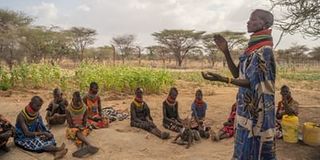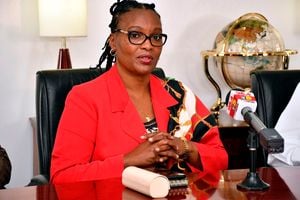Kenya to benefit from $282 million climate action initiative

Turkana women in Kenya have now taken to farming to supplement their diets.
What you need to know:
- The goal of the initiative is to strengthen efforts to transform global agrifood systems.
- Partnership includes 186 member governments with a focus on integration and inclusivity.
In Riyadh, Saudi Arabia
Kenya is set to benefit from a new $282 million program targeting climate and environmental action through agriculture and food systems.
The development has been jointly announced by the Food and Agricultural Organization(FAO) and the International Fund for Agricultural Development (IFAD).
The two bodies disclosed that they will support the design and launch of the 32-country projects over the next 12 months in target countries, Kenya included.
This means that the countries will have global coordination hubs on policy and governance, private sector and investment, landscape-level – farmland, agroforestry sites, and other non-protected areas – innovation, and knowledge management will build communities of practice and enhance coordination throughout the duration of the program to generate greater impact than the sum of individual country projects.
FAO and IFAD explained that the goal of the initiative, known as the Food Systems Integrated Program (FSIP), is to strengthen efforts to transform global agrifood systems – from farm to table – so that they are sustainable, nature-positive, resilient, inclusive, and pollution-free.

Turkana women in Kenya have now taken to farming to supplement their diets.
The Global Environment Facility (GEF) is a multilateral family of funds dedicated to confronting biodiversity loss, climate change, and pollution, and supporting land and ocean health according to UNCCD.
Its financing enables developing countries to address complex challenges and work towards international environmental goals.
The partnership includes 186 member governments as well as civil society, Indigenous Peoples, women, and youth, with a focus on integration and inclusivity.
Over the past three decades, the GEF has provided more than $25 billion in financing and mobilized $145 billion for country-driven priority projects.
Making the official announcement at the 16th Conference of the Parties of the United Nations Convention to Combat Desertification (UNCCD COP16) in Riyadh, Saudi Arabia on Friday, Carlos Manuel Rodríguez, CEO and Chairperson GEF said the program targets agrifood systems of four sectors – crops (maize, rice, and wheat), commodities (cocoa, palm oil and soy), livestock, and aquaculture.

Turkana women in Kenya have now taken to farming to supplement their diets.
This will apply across 32 countries namely Kenya, Angola, Argentina, Benin, Bhutan, Burkina Faso, Chad, Chile, China, Costa Rica, Ecuador, Eswatini, Ethiopia, Ghana, Grenada, India, Indonesia, Kazakhstan, Malaysia, Mexico, Namibia, Nauru, Nigeria, Pakistan, Peru, Philippines, Solomon Islands, South Africa, Sri Lanka, Tanzania, Türkiye, and Uganda.
FAO director-general Qu Dongyu said agrifood systems hold the solutions to major interlinked challenges to people and the planet.
“The Global Biodiversity Framework, the Paris Agreement, and the SDGs are unattainable without agrifood systems transformation. The Food Systems Integrated program offers the opportunity to put agrifood solutions into action and channels investments towards scalable results,” he said.
He said FAO is committed to working with members, farmers, producers, consumers and partners, including the private sector, and across sectors, to transform global agrifood systems to be more efficient, inclusive, resilient and sustainable for the Four Betters: better production, better nutrition, a better environment and a better life – leaving no one behind.”
“The Food Systems Integrated Program is a transformative initiative to make food systems more sustainable and resilient, and to ensure that small-scale farmers can continue to produce one-third of the world’s food even through the uncertainty of climate change,” Alvaro Lario, the President of IFAD, said.

Turkana women in Kenya have now taken to farming to supplement their diets.
Mr Dongyu explained that the new $282 program launched builds upon nearly a decade of GEF investments in global programs on food systems, including The Good Growth Partnership, Resilient Food Systems and the Food Systems, Land Use and Restoration Impact Program.
Approved and designed after the UN Food Systems Summit, the FSIP program will support countries to meet commitments for the Kunming-Montreal Global Biodiversity Framework, the Paris Agreement on climate change, and Land Degradation Neutrality.
“The program comes amid growing international attention to the key role of food and agriculture systems at the recent UN environmental Conferences of the Parties (COPs) for three different conventions. These include the launch of the Agri-NBSAPS Initiative at the 'CBD COP16' for biodiversity, and the Harmoniya Initiative launched at the UNFCCC COP29 for climate,” UNCCD said in an official statement.
All three COPs have prominently featured discussions on financing - agrifood systems accounted for less than 5 per cent of total global climate finance (2019/2020) and 23 percent of the total climate-related development finance (2022), a decline from 37 per cent in the previous decade.
In an exclusive interview with Nation.Africa, Mr Li Lifeng, the director land and water division at FAO urged the Kenyan government to intensify efforts when it comes to monitoring and testing fertilizers that reach smallholder farmers using science so as to ensure it is not fake and is of good quality.

Turkana women in Kenya have now taken to farming to supplement their diets.
He further urged Kenyans to embrace ‘forgotten traditional foods’ to supplement their diets amid the climate crisis which he says have very high nutritional value.
“We(FAO) have a code of conduct for fertilizer use and management so we encourage Kenya and other countries to use it because if you look at the green revolution, fertilizers are part of the solution that can boost productivity of crops, fertilizer producers should also produce the right fertilizers for better soil health,” Mr Lifeng said.
“We recognize ‘forgotten crops’ because very often they are nutritious, indigenous and drought resilient, that’s why in our division, to address the water scarcity challenge we are working with Tunisia, Mozambique, Mali and Malawi to promote indigenous food, nutritious and drought resilient crops,” he added.
The director at FAO’s land and water division elaborated on how they are doing it.
“We asked them to select those crops and then figure out how they can build the conditions to scale them up. If they can’t do it because of capacity, knowledge or policy issues, that’s where we come in to support,” he said.





